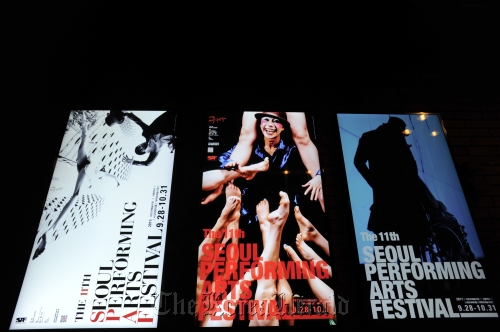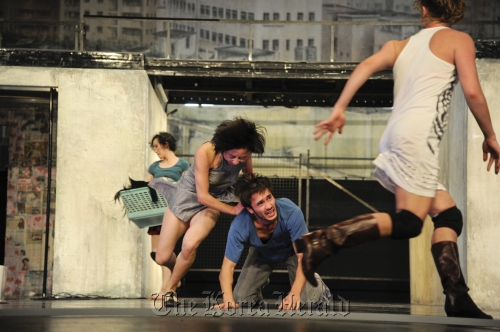
The 11th Seoul Performing Arts Festival opens with powerful German show “Megalopolis”
Poverty-stricken streets are filled with raw groans of drunken prostitutes and homeless beggars, desperate young people struggle to find work, severely home-sick immigrants scream in pain, while other souls break down in public from the horrors of loneliness.
Welcome to Megalopolis, the metaphysical version of our modern-day megacities.
Directed by Argentinean-born choreographer Constanza Macras, Berlin-based German dance company Dorky Park’s “Megalopolis” presents a very disturbing yet powerful portrait of the underbelly of urban life. A multidisciplinary piece which incorporates dance, theater, live music and moving pictures, the show has been officially selected as the opener for the 11th Seoul Performing Arts Festival, which kicked off on Sept. 28.

“Megalopolis” is an exhaustingly entertaining experience. The intentional musical dissonance created by live electric violin performance is fused with constant swearing and groaning sound shouted by the performers, while the film screen showcases random video footage of real-life big cities -- which subtly resembles the style of Ron Fricke’s 1992 non-narrative film “Baraka” – including Japan’s flashing neon signs and mass grocery products lined up in an American hypermarket.
While there is no solid narrative, the performers speak so much with their mind-blowing yet hard-to-watch choreography, many of which seem to be physically painful – painful enough to make their joints crack -- to deliver. Wearing protective knee braces, the deeply tormented characters cry for help, suffer from utter violence and abuse, and seek for solidarity from indifferent others – all in their sadistic-inspired anguish and behavior.
Having many dancers with diverse ethnic backgrounds, the show by Dorky Park also presents an interesting overview of the stereotypes and clichés of ethnic minorities. There is a Korean religious fanatic, and an abusive African-American policeman. It seems as if Macras wanted to challenge the stereotypes by creating a kitsch version of them, combining humor, tragedies and constantly abused bodies at the same time.
For example, when an old Japanese-born homeless beggar is singing a piece of Enka pathetically, a struggling young Caucasian artist sings along, thinking “Watashi Wa” in the lyrics -- meaning “I am” in Japanese -- as an English sentence “what does she want.” The scene is both pathetic and funny, yet also brings sadness and sense of disconnection.
And there are some beautiful theatrical metaphors, when a homeless woman, who is covering her head with a white plastic bag used for garbage, runs into a newly-married bride. The two look strikingly similar for the very moment, but the audience members know they’d never cross paths with each other again.
Regarded as one of the biggest performing arts festivals in Asia, SPAF this year features a total of 37 works from eight different countries: Korea, Australia, Germany, Italy, Japan, Colombia, France, and Armenia. Aiming to introduce “the future of the performing arts,” this year’s highly innovative, cutting-edge and wide-ranging program is divided into three different genres: theater, dance, and multidisciplinary.
Must-sees include Australian play “Small Metal Objects,” which will be staged in Seoul Station with real-life pedestrians as unwitting extras. The audience members will each be given a pair of headphones, and therefore have an exclusive access to the private conversations shared by invisible performers who are surrounded by constantly-moving passers-by in the public space.
Meanwhile, Korea’s ChungMac Theater Group’s theatrical play “Makeup” offers a fascinating interpretation of Joseon art and aesthetics, under the presumption that Sarakuga, one of the most prominent artists in Japanese history, also lived as an artist in Joseon during the reign of Jeongjo as well. Filled with artistic and historical flair, the play follows the artist’s search for color and love while trying to fulfill his innermost artistic desire.
SPAF 2011 runs until Oct. 31 at major theatre venues at Daehangno -- the Arko Arts Theater and Daehangno Arts Theater. For tickets and information, call (02) 3668-0007 or visit www.spaf.or.kr.
By Claire Lee (dyc@heraldcorp.com)



![[Herald Interview] 'Amid aging population, Korea to invite more young professionals from overseas'](http://res.heraldm.com/phpwas/restmb_idxmake.php?idx=644&simg=/content/image/2024/04/24/20240424050844_0.jpg&u=20240424200058)












![[KH Explains] Korean shipbuilding stocks rally: Real growth or bubble?](http://res.heraldm.com/phpwas/restmb_idxmake.php?idx=652&simg=/content/image/2024/04/25/20240425050656_0.jpg&u=)

